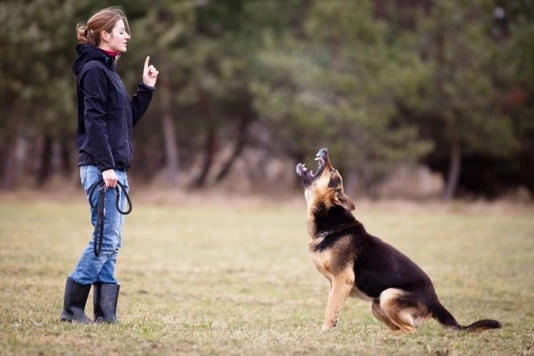How to Find a Dog Trainer
Choosing a knowledgeable dog trainer near you is an important decision to get your dog’s behavior on the right track and forge a positive relationship with them. Here are recommendations for what you need to know to make a great choice when picking a behavioral specialist for your best buddy.
Types of Dog Training Services
Different trainers specialize in various approaches and services. If you can’t locate a reliable dog trainer near you, remote lessons are another option to consider.
Types of services include:
- Private lessons / in-home training classes
- Group classes at training facilities
- Virtual / online / remote training
- Board and train programs / doggy boot camps
- Puppy socialization classes
Professional Certifications to Look For
The dog training industry isn’t strictly regulated, but reputable trainers often hold certifications from recognized organizations:
- CPDT-KA – Certification Council for Professional Dog Trainers
- IAABC – International Association of Animal Behavior Consultants
- APDT – Association of Professional Dog Trainers
- KPA-CTP – Karen Pryor Academy Certified Training Partner
Average Cost of Dog Training
Pricing varies significantly based on location and service type:
- Private sessions: $50-150 per hour or session
- Group classes: $50-200 for 4-8 weeks
- Board and train programs: $500-2,500+ per week, often including obedience training
Factors affecting price include:
- Trainer’s experience in obedience training and canine behavior
- Location and local market rates can influence the availability of private classes
- Length and intensity of training program
- Specific behavior issues being addressed
- In-home vs group vs online
- Discounts for two dogs vs one dog
Frequently Asked Questions to Assess Trainers
- What training techniques do you use in your private lessons?
- What certifications do you hold?
- Can you provide references from recent clients?
- How do you handle challenging behaviors?
- What’s your policy on using training tools?
- Do you offer ongoing support after training?
- What’s your cancellation policy?
Red Flags to Watch For
Be cautious if a trainer:
- Guarantees specific results in a set timeframe
- Won’t let you observe their training methods
- Uses punishment-based methods
- Lacks insurance
- Can’t explain their training philosophy clearly
- Has no recent client references or testimonials
- Requires lengthy contracts or unclear terms
If you’re still unsure, be sure to ask for references who may be able to clarify any of these red flags.
What to Expect in Training
When you enroll in training classes, here’s what that may entail:
- Initial consultation to assess needs and identify issues
- Development of a customized training plan
- Hands-on training sessions
- Homework exercises to practice new skills
- Progress evaluations
- Follow-up support to strengthen new behaviors
Many dog owners may learn that the training oftentimes is actually how you can train your pooch yourself!
Popular Pet Training Techniques
Great dog training typically falls into these categories:
- Positive reinforcement training
- Clicker training
- Force-free methods
- Balanced training
- Behavior modification
- Relationship-based, one-on-one training
Getting Started with Professional Training
The best time to start training is:
- New puppy training programs: As early as 8 weeks
- Adult dogs: Any time, but sooner is better
- New adoptees: After a 2-week adjustment period, it’s important to start basic commands
Common Training Goals
Every dog is unique with different issues you may want your dog to correct. Your dog’s training may address:
- Basic obedience (sit, stay, come)
- Leash walking
- Leash pulling (get the dog to stop tugging and lunging)
- Housebreaking and potty training
- Crate training
- Good manners around children
- Ability to socialize (to get your puppy to behave well in public settings)
- Separation anxiety reduction
- Aggression management
- Excessive barking
- Nipping and biting
Dog Trainers in Your State
Now that you have an idea of what it takes to ensure a trainer is the right one for you, your family, and your canine companion, you need to make a choice! Try browsing our directory of potential dog trainers by state to find a trainer that specializes in your dog’s issues and what you want your dog to learn.
